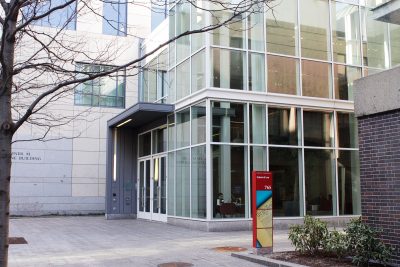
Boston University’s undergraduate programs are not the only schools that have been affected by coronavirus. The School of Law has also moved completely online as the COVID-19 pandemic continues. As a result, students and faculty have been forced to make many changes.
Classes, moot courts, mock trials and opportunities like public defender and prosecution clinics are continuing for students online via video conferencing platform Zoom for the rest of the Spring semester.
Jeremy Thompson, assistant dean of LAW, said both the transition to virtual learning and the faculty’s response to the change has been excellent.
“I’ve been very impressed with the faculty conversations I’ve been privy to,” Thompson said. “They’ve been extremely thoughtful and caring about how they are trying to adapt everything and meet all the students’ needs.”
Thomspon also said LAW, in line with BU as a whole, is prioritizing the students’ safety in this unprecedented time.
“I think that it really is a terrific community here at BU Law,” Thompson said. “Our main concern right now is really making sure that students remain engaged and are taking care of themselves, because health and well-being are most important.”
Karen Pita Loor, associate dean of Experimental Education at LAW, said that ensuring the safety of LAW students participating in externships is one of the schools’ top priorities.
“We never wanted to make students feel obligated to show up, let’s say to court or to an office, if they felt like it was unsafe for them,” Loor said. “The first concern we have is the safety of the students.”
While many students can work remotely for the externships, Loor said LAW is making an effort to continue to provide students opportunities for remote work if their externships cannot provide them the option.
“We told the students that if there was no possibility in the externships… for them to do remote work,” Loor said, “then we would find other ways for them to do this type of work.”
LAW is also implementing a pass/fail grading system that differs for each program within the school.
The Juris Doctor Degree (JD) program is on a mandatory pass/fail system for this semester. The Master of Laws Degree (LLM) is on an optional pass/fail system, similar to that of BU’s undergraduate schools.
Students are also able to meet with their career advisors via Zoom meetings or phone calls through the Career Development Office.
Thompson said while certain aspects of students’ education, such as moot courts, are not able to be entirely replicated online, students will still have valuable takeaways from the exercises.
“It’s not exactly the same as being in person,” Thompson said. “But [the director of moot courts] is finding [remote courts] effective and the students seem to be bought in and doing quite well within the context of the virtual environment.”
BU LAW is also closely monitoring the National Conference of Bar Examiners’ statements about the bar exam. According to the LAW website, there is “possibility of a fall administration of the exam if it is not able to be offered in July.”
State-specific updates on the bar exam have since been made, and Massachusetts and New York are both postponing the July test dates to the fall.
LAW’s class of 2020 commencement is planned to be held in the late summer or early fall, with intentions to coordinate with BU’s undergraduate commencement. The goal for LAW is to follow the suggestions of BU Administration when a final decision is made about when commencement will be held.
























































































































